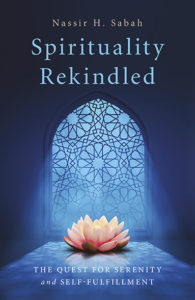(Original article: Mystic Living Today, December 2023)
Nassir H. Sabah
This article discusses an immensely important aspect of spirituality: the reliance on God and deference to His will, based on the book Spirituality Rekindled. Previous articles in Mystic Living Today provide some background to the present discussion, such as: “What Is the Purpose and Meaning of Life? (May 2023), “A Call to Spirituality” (June 2023), “Is There Objective Evidence for the Existence of God?” (July 2023), “Why Does God Allow Suffering and Evil?” (September 2023), “The Human Predicament” (October 2023), and “How Should We Think About God?” (November 2023).
Belief in God and in the Afterlife is the cornerstone of the advocated spirituality, understood to be a quality of being that is predicated on a sense of connection to God Almighty, the creator of the universe and the guide and sustainer of everything in it. It is also of paramount importance to recognize the purpose and meaning of our existence. God, in His infinite loving-mercy, created humans to attain eternal bliss in Heaven, which is the ultimate purpose of life. He created humans with a wondrous conscious self that can be righteous or wicked, having free will and astonishing mental capacities. This worldly life, with its suffering and evil, has been made a trial for humans to follow the right path, which is to serve God by reflecting what can be humanly reflected from His glorious and perfect attributes. Humans should therefore conduct themselves virtuously in good deeds and moral behavior towards all around them. This virtuous conduct is the result of progressive self-development – spiritually, psychologically, morally, and intellectually – which gives meaning to life.
Embracing the advocated spirituality entails having absolute reliance on God and deference to His will. What does this mean?
- Humans, whether they like it or not, or care to admit it or not, are inescapably subject to God’s will and power, like everything else in the universe. All their thoughts and all their actions are known to Him, for He is All-Versed and All-Knowing. It behooves us, therefore, to follow the right path of believing in Him, relying on Him, and seeking His loving-mercy in attaining eternal bliss in heaven.
- Reliance on God reflects one’s confidence and trust in Him, which one should always have, for He is Omnipotent, Most Compassionate, Ever-Merciful, All-Knowing, All-Wise, and All-Just.
- Reliance on God means that we completely surrender ourselves to Him, making Him our everyday guide, refuge, and solace.
- Reliance on God should never be construed as indolent dependence. One should never just stand by, without trying one’s best in any given situation, and think one could simply relegate the doing to God. That is most abhorrent and is not what humans were created for. God has endowed us with will and abilities and expects us to always do our best.
What is the impact of reliance on God and deference to His will, as part of the advocated spirituality, on our everyday thoughts, feelings, attitudes, and conduct?
- One would experience that very comforting feeling that one is being cared for and guided by the Most Compassionate and Ever-Merciful master of the universe. Small, everyday matters seem to proceed smoothly, and favorable outcomes seem to happen fortuitously. Right decisions appear to come intuitively. One is aware that this is not happenstance, but a sign of His loving care, for which one should be immensely grateful.
- We all have our wishes for good happenings and might supplicate God for their fulfillment. Some may naïvely expect that such wishes will be automatically fulfilled upon asking and are greatly disappointed if this does not happen without undue delay. This is undoubtedly the wrong attitude. We should only entreat and hope, and not be certain about fulfillment. After all, it is we who are submitting to God’s will, and not the other way round. We are self-centered and preoccupied with our own views and outlook. On the other hand, God has the big picture. He is All-Knowing and has full knowledge of the unseen, that is, everything that is beyond human perception, such as future events, metaphysical matters, and all the inner aspects of everything. We must defer to what He has decreed for us and accept it most willingly. In fact, what we think is good for us may not be to our advantage in the long run.
- We must expect some misfortune to befall us, for life is a trial for humans to earnestly believe in God, submit to His will, and serve Him. No matter how severe the affliction is, be it the loss of loved ones or some serious health issues, we must unquestionably accept it with patience and forbearance and consider it as a step towards our spiritual purification. We must appreciate that this worldly life is but a blink on the eternal scale, and we must have absolute certainty of a just requital in the Afterlife by the All-Just, The Most Compassionate, and The Ever-Merciful. This is the ultimate reward that one should aspire to, and it is what matters most. From this perspective, death is simply a transition between our transient worldly life and the eternal Afterlife. We should entreat God to not try us beyond what we can bear and to alleviate any afflictions that might befall us.
In summary, we should always do our best and leave the rest to God, with full confidence and trust in Him. We should always defer to His will, relishing our good fortune with immense gratitude, and accepting misfortune with fortitude. It is not easy to get into this state of being, but the psychological benefit is tremendous. Not only in the banishment of stress and anxiety over everyday concerns and frustrations but also in fearing nothing and no one, for one is fortified by the consummate feeling that one is being accorded the mercy, guidance, and care of He who is Omnipotent, Omniscient, Most-Compassionate, Ever-Merciful, All-Wise, and All-Just.
